Theories, Principles, and Models of Learning and Communication
Added on 2023-01-05
22 Pages7490 Words1 Views
Unit 502: Theories, Principles
and Models in Education and
Training
and Models in Education and
Training
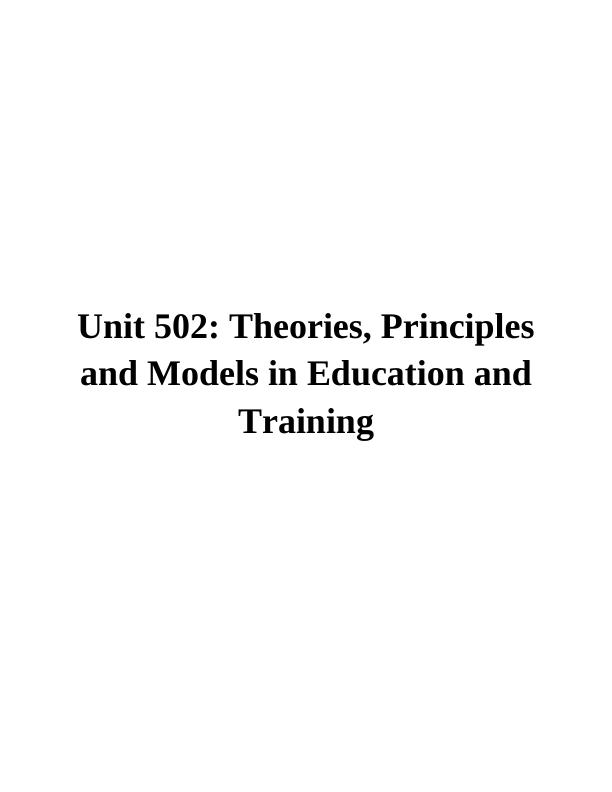
TABLE OF CONTENTS
INTRODUCTION...........................................................................................................................3
TASK 1............................................................................................................................................3
1.1 Theories, principles and model of learning.......................................................................3
1.2 Ways to apply theories, principles and models of learning..............................................6
1.3 Model of learning preferences..........................................................................................6
1.4 Identify and taking account of individual learning preferences........................................7
TASK 2............................................................................................................................................8
2.1 Theories, model and principles of communication................................................................8
2.2 Ways to apply principles, models and theories of communication.......................................9
TASK 3............................................................................................................................................9
3.1 Theories, models and principles of assessment.....................................................................9
3.2 Ways in which theories, models and principles of assessment can be applied in assessing
learning......................................................................................................................................11
TASK 4..........................................................................................................................................12
4.1 Theories, models and principles of curriculum development..............................................12
4.2 Ways in which theories, models and principles of curriculum development can be applied
in assessing learning..................................................................................................................13
TASK 5..........................................................................................................................................14
5.1 Theories, models and principles of reflection and evaluation.............................................14
5.2 Ways in which theories, models and principles of reflection and evaluation can be applied
in assessing learning..................................................................................................................17
CONCLUSION..............................................................................................................................17
REFERENCES..............................................................................................................................19
INTRODUCTION...........................................................................................................................3
TASK 1............................................................................................................................................3
1.1 Theories, principles and model of learning.......................................................................3
1.2 Ways to apply theories, principles and models of learning..............................................6
1.3 Model of learning preferences..........................................................................................6
1.4 Identify and taking account of individual learning preferences........................................7
TASK 2............................................................................................................................................8
2.1 Theories, model and principles of communication................................................................8
2.2 Ways to apply principles, models and theories of communication.......................................9
TASK 3............................................................................................................................................9
3.1 Theories, models and principles of assessment.....................................................................9
3.2 Ways in which theories, models and principles of assessment can be applied in assessing
learning......................................................................................................................................11
TASK 4..........................................................................................................................................12
4.1 Theories, models and principles of curriculum development..............................................12
4.2 Ways in which theories, models and principles of curriculum development can be applied
in assessing learning..................................................................................................................13
TASK 5..........................................................................................................................................14
5.1 Theories, models and principles of reflection and evaluation.............................................14
5.2 Ways in which theories, models and principles of reflection and evaluation can be applied
in assessing learning..................................................................................................................17
CONCLUSION..............................................................................................................................17
REFERENCES..............................................................................................................................19
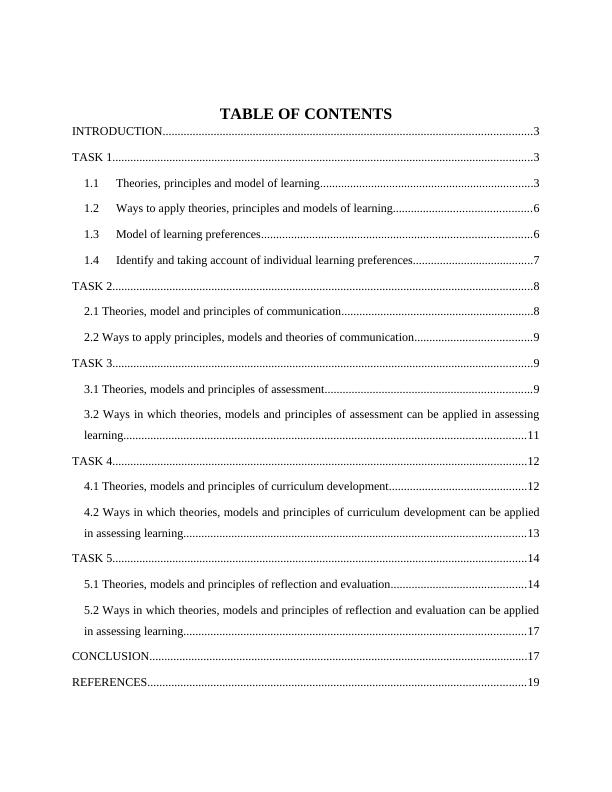
INTRODUCTION
Learning is defined as grabbing knowledge about something that an individual not keen
of doing or either enhancing the knowledge so something that already acquired by an individual
(Aljohani and et.al., 2019). This report will emphasis over different aspects related to the
learning. Henceforth, report will emphasis on different theories, principles and models of
learning. Different ways in which theories, models and principles of learning are apply. Model of
learning preferences are analysis in this report. This report will also identify and taking account
of learner individual learning preferences enable inclusive teaching and assessment. Theories,
principles and models of communication will also project in this project. Ways to apply those
theories, principles and model of communication will also identify in this report. Different
theories, principles and model of assessment will also project. How hose theories, principles and
model will implement in order to learn will also understand in this report. Furthermore, report
will emphasis on curriculum and development. Different technique through which these theories
and model will apply in context to learning. Theories and model of reflection will also
understand in this project. Different ways in which these theories and principles will implement.
TASK 1
1.1 Theories, principles and model of learning
Theories of learning
Learning is all about grabbing knowledge and new skill for acquiring new aspects that
can allow the overall growth and development of an individual. Theories that can support the
learning can be projected in the following points.
Cognitive learning theory: Cognitive learning theory is the way people think towards the
learning. This theory work on the concept that learner can influence both internal and external
elements with the learning outcomes. This learning give focus on how internal and environment
influence the learning of an individual. Cognitive leaning theory is an important learning
program which allows learner to grow different skills and knowledge in form of teach (Hung,
2017). This theory favours that internal and external both these elements are a crucial part of the
Learning is defined as grabbing knowledge about something that an individual not keen
of doing or either enhancing the knowledge so something that already acquired by an individual
(Aljohani and et.al., 2019). This report will emphasis over different aspects related to the
learning. Henceforth, report will emphasis on different theories, principles and models of
learning. Different ways in which theories, models and principles of learning are apply. Model of
learning preferences are analysis in this report. This report will also identify and taking account
of learner individual learning preferences enable inclusive teaching and assessment. Theories,
principles and models of communication will also project in this project. Ways to apply those
theories, principles and model of communication will also identify in this report. Different
theories, principles and model of assessment will also project. How hose theories, principles and
model will implement in order to learn will also understand in this report. Furthermore, report
will emphasis on curriculum and development. Different technique through which these theories
and model will apply in context to learning. Theories and model of reflection will also
understand in this project. Different ways in which these theories and principles will implement.
TASK 1
1.1 Theories, principles and model of learning
Theories of learning
Learning is all about grabbing knowledge and new skill for acquiring new aspects that
can allow the overall growth and development of an individual. Theories that can support the
learning can be projected in the following points.
Cognitive learning theory: Cognitive learning theory is the way people think towards the
learning. This theory work on the concept that learner can influence both internal and external
elements with the learning outcomes. This learning give focus on how internal and environment
influence the learning of an individual. Cognitive leaning theory is an important learning
program which allows learner to grow different skills and knowledge in form of teach (Hung,
2017). This theory favours that internal and external both these elements are a crucial part of the
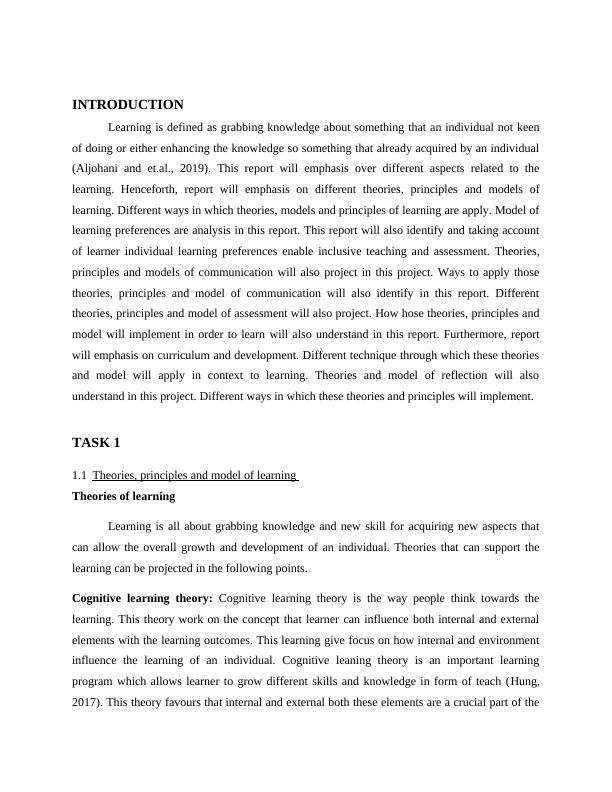
learning. In order to grab the best learning outcomes learner need to control all these internal and
external factors that influence the learning of an individual.
Behaviourism learning theory: Behaviour learning theory suggests that how a student behave
is depends upon the interaction with the environment. This theory indicates that behaviour are
influenced and learnt from the external forces. This theory work on the behaviour that can
support healthy learning of student. This theory simply works on the human behaviour that can
support the learning of an individual. The mindset and attitude play a crucial role in learning.
Psychology can be observed and quantified.
Constructive learning theory: Constructive learning theory is based on the idea students create
on the basis of the experience and knowledge they acquired. Students try to learn the new things
with inclusion of previous knowledge and experience of such student. The previous learning they
hold influence the entire learning outcomes of student in this learning theory.
The above mentioned theories are the key learning theories that allow the students to grab
the knowledge and information over certain topics.
Principle of learning
Learning is associated with various principles that can be projected in the following
points.
Participation: Learning is more based on participation. Student needs to participate in the entire
learning than only positive outcomes out of the learning can be delivered. Participation needs to
be done from both the side’s student side and teacher side (Henderson and Trede, 2017).
Learning is a mutual activity that conducted between student and teacher. Participation makes
the learning more effective and efficient in favour of the student.
Repetition: Student must repeat the entire learning. This is a key principle associated with the
learning. Whatever student has learnt must repeat to practice the respective learning. Practices
makes the learning more fluent and it create a convenience between learner and the student
(Manohar and et.al., 2018). This is the key principle associated with the learning that makes the
entire learning more useful in favour of the student and society.
external factors that influence the learning of an individual.
Behaviourism learning theory: Behaviour learning theory suggests that how a student behave
is depends upon the interaction with the environment. This theory indicates that behaviour are
influenced and learnt from the external forces. This theory work on the behaviour that can
support healthy learning of student. This theory simply works on the human behaviour that can
support the learning of an individual. The mindset and attitude play a crucial role in learning.
Psychology can be observed and quantified.
Constructive learning theory: Constructive learning theory is based on the idea students create
on the basis of the experience and knowledge they acquired. Students try to learn the new things
with inclusion of previous knowledge and experience of such student. The previous learning they
hold influence the entire learning outcomes of student in this learning theory.
The above mentioned theories are the key learning theories that allow the students to grab
the knowledge and information over certain topics.
Principle of learning
Learning is associated with various principles that can be projected in the following
points.
Participation: Learning is more based on participation. Student needs to participate in the entire
learning than only positive outcomes out of the learning can be delivered. Participation needs to
be done from both the side’s student side and teacher side (Henderson and Trede, 2017).
Learning is a mutual activity that conducted between student and teacher. Participation makes
the learning more effective and efficient in favour of the student.
Repetition: Student must repeat the entire learning. This is a key principle associated with the
learning. Whatever student has learnt must repeat to practice the respective learning. Practices
makes the learning more fluent and it create a convenience between learner and the student
(Manohar and et.al., 2018). This is the key principle associated with the learning that makes the
entire learning more useful in favour of the student and society.
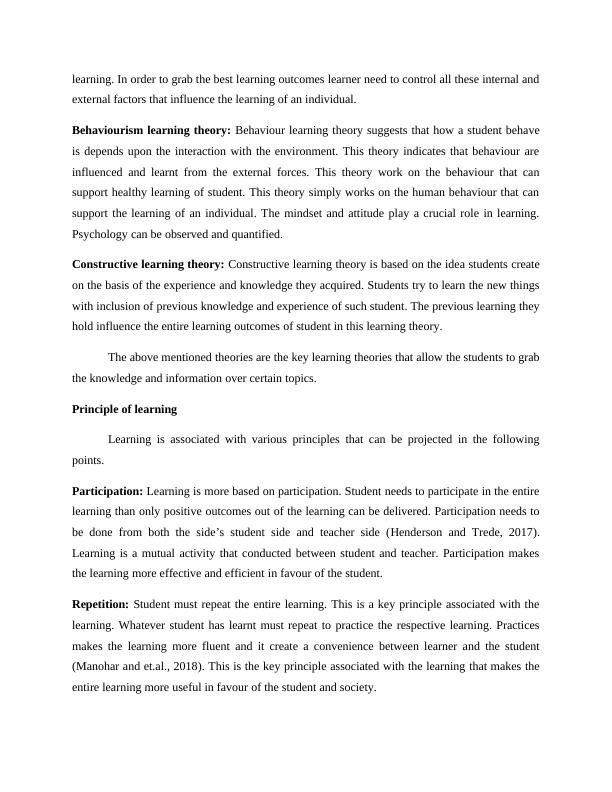
Relevance: Relevance should also be a part of learning. This is the key principle associated with
the learning. Student must relive over the process of learning. This makes the learning more
effective and useful.
Transference: Learning involves transference of knowledge. Teacher guide the student the
knowledge and whatever the teacher knew transfer it into the student. Transfer of knowledge and
information is a significant part of learning.
Feedback: Regular feedbacks also involved in learning. The knowledge student grabs needs to
be tasted by the teacher. In order to take feedback teacher ask question and take taste to check
whether the student could grab the knowledge in the way teacher has delivered to the student or
not.
The above mentioned principles are the key principles associated with the learning.
Models of learning
Following are the models associated with the learning.
Contextual learning model: Contextual learning model inter connect the learning modules with
the real world examples. This model inters link learning with practical situations and derives the
best learning results in favour of the student. This model makes the learning more
understandable and indicates the practical implications of learning in specific situations.
Cooperative learning model: This meaning work on the fundamental where group of students
come together and initiate learning. This is an effective technique that consumes more than one
student to conduct the learning outcomes (Wanner and Palmer, 2018). All such students also
become part of the learning and can support other students in solving their personal doubts.
Quantum learning model: Quantum learning model consumes already existed learning
technique to implement the learning. This is a key technique which involves both old as well
new techniques to learn.
Integrated learning model: In this concept students at both the level individual level and in
group try to grab knowledge of learning. This is a critical approach to grab the knowledge. This
the learning. Student must relive over the process of learning. This makes the learning more
effective and useful.
Transference: Learning involves transference of knowledge. Teacher guide the student the
knowledge and whatever the teacher knew transfer it into the student. Transfer of knowledge and
information is a significant part of learning.
Feedback: Regular feedbacks also involved in learning. The knowledge student grabs needs to
be tasted by the teacher. In order to take feedback teacher ask question and take taste to check
whether the student could grab the knowledge in the way teacher has delivered to the student or
not.
The above mentioned principles are the key principles associated with the learning.
Models of learning
Following are the models associated with the learning.
Contextual learning model: Contextual learning model inter connect the learning modules with
the real world examples. This model inters link learning with practical situations and derives the
best learning results in favour of the student. This model makes the learning more
understandable and indicates the practical implications of learning in specific situations.
Cooperative learning model: This meaning work on the fundamental where group of students
come together and initiate learning. This is an effective technique that consumes more than one
student to conduct the learning outcomes (Wanner and Palmer, 2018). All such students also
become part of the learning and can support other students in solving their personal doubts.
Quantum learning model: Quantum learning model consumes already existed learning
technique to implement the learning. This is a key technique which involves both old as well
new techniques to learn.
Integrated learning model: In this concept students at both the level individual level and in
group try to grab knowledge of learning. This is a critical approach to grab the knowledge. This
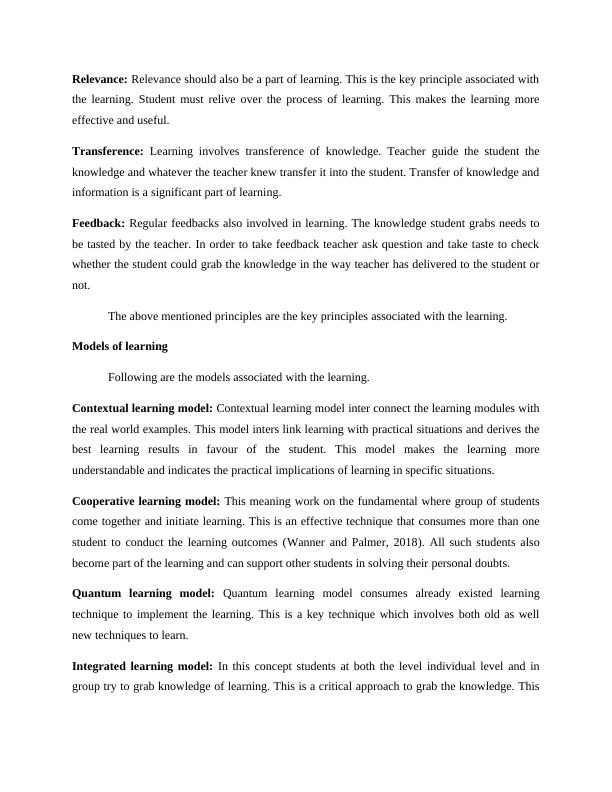
model is a combination of more than one technique of learning in which student get to grab
knowledge at both the level individual and group level.
Model problem based learning: This learning is not based on what student can grab but this is
rather based on what can be conveyed to student once the learning process start. The process of
learning involve multiple issues with student they face in order to grab the knowledge (Mulyana,
Rusdi and Vivanti, 2018). All such issues and problems student’s face they discuss with other
students and teacher and by solving the doubt learning is completed in this method.
The above mentioned models are the key techniques to conduct the learning program.
1.2 Ways to apply theories, principles and models of learning
These are the specific ways to apply these learning that can be projected in the following
points.
Conduct training: Conducting training is the best way to implement the learning activity.
Training of students can be done so that knowledge can impart to student (Ismail, Sinayskiy and
Petruccione, 2019). This is the best technique that can be implemented to support the knowledge
in student.
Learning sessions: Learning sessions can be taken of students. Learning session will involve
different learning program. This is the best technique to channelize the learning. This is the best
technique to conduct the learning activity in student.
Feedbacks over learning: Feedbacks are conducted to analysis the efficiency of learning.
Feedback is the way that allows to ask the question from the students about the learning activity
and the effectiveness of the learning sessions.
Test: This is also an approach that can be conducted to identify weather the learning is effective
(Pasquaré Mariotto and Tibaldi, 2020). Test allows the teacher to identify how much the
knowledge students are grabbing out of the learning program.
The above mentioned techniques can be channelized to achieve the overall objectives
behind the learning program.
knowledge at both the level individual and group level.
Model problem based learning: This learning is not based on what student can grab but this is
rather based on what can be conveyed to student once the learning process start. The process of
learning involve multiple issues with student they face in order to grab the knowledge (Mulyana,
Rusdi and Vivanti, 2018). All such issues and problems student’s face they discuss with other
students and teacher and by solving the doubt learning is completed in this method.
The above mentioned models are the key techniques to conduct the learning program.
1.2 Ways to apply theories, principles and models of learning
These are the specific ways to apply these learning that can be projected in the following
points.
Conduct training: Conducting training is the best way to implement the learning activity.
Training of students can be done so that knowledge can impart to student (Ismail, Sinayskiy and
Petruccione, 2019). This is the best technique that can be implemented to support the knowledge
in student.
Learning sessions: Learning sessions can be taken of students. Learning session will involve
different learning program. This is the best technique to channelize the learning. This is the best
technique to conduct the learning activity in student.
Feedbacks over learning: Feedbacks are conducted to analysis the efficiency of learning.
Feedback is the way that allows to ask the question from the students about the learning activity
and the effectiveness of the learning sessions.
Test: This is also an approach that can be conducted to identify weather the learning is effective
(Pasquaré Mariotto and Tibaldi, 2020). Test allows the teacher to identify how much the
knowledge students are grabbing out of the learning program.
The above mentioned techniques can be channelized to achieve the overall objectives
behind the learning program.
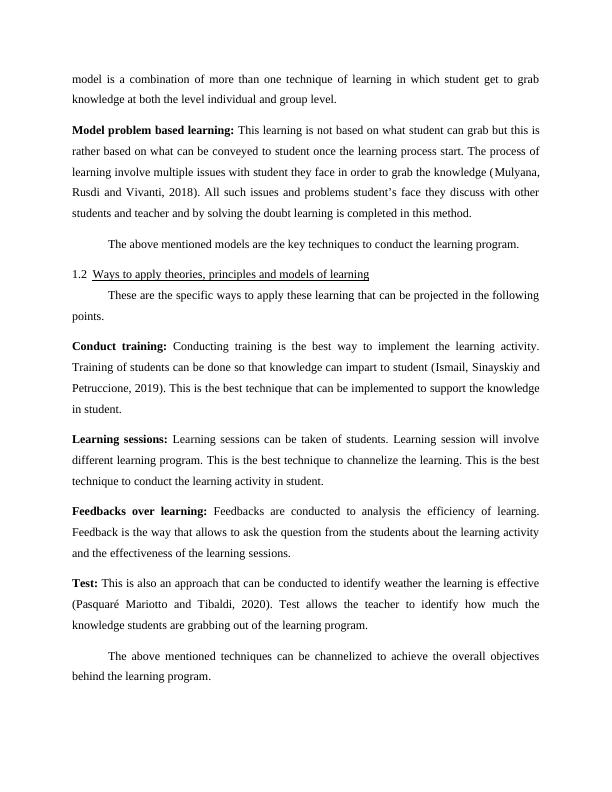
End of preview
Want to access all the pages? Upload your documents or become a member.
Related Documents
Theories, Principles and Models in Education & Traininglg...
|23
|8515
|438
Theories Principles and Models of Learning and Teaching in Educationlg...
|8
|2767
|353
Theories, Principles and Models in Education and Traininglg...
|20
|6792
|376
Theories, Principles and Models in E & T - Reportlg...
|16
|5544
|124
Analysis Theories, Principles, Models of Learning Preferences : Assignmentlg...
|34
|9367
|354
Theories, Principles and Models in Education and Traininglg...
|17
|6844
|63
